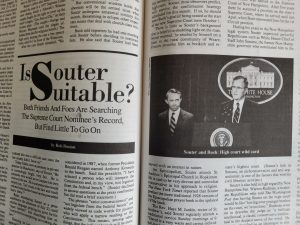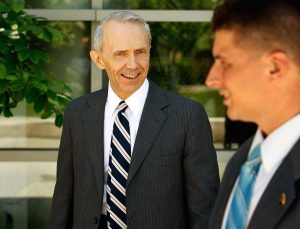
I was saddened recently to hear the news of the death of former Supreme Court Justice David H. Souter. He was a personal hero of mine, a man with a keen intellect and a sharp legal mind who was a champion of church-state separation.
Souter’s death brought back memories of when he was nominated to the court by President George H.W. Bush in July 1990. No one knew much about the man, and at Americans United, we scrambled to figure out what sort of justice he might be. This was a pre-internet time, so I hit the phone.
I called several people who knew Souter personally and had worked with him. They all assured me that Souter was a bright guy and personally warm and engaging, but they were tight-lipped about how he might rule on church-state separation.
‘Stealth nominee’
Souter was dubbed a “stealth nominee” by the media, and his slim record worried some on the right. Patrick McGuigan, a far-right figure who worked on the editorial page of the Daily Oklahoman in Oklahoma City, complained to White House Chief of Staff John Sununu that Bush had missed an opportunity to “hit a home run” by nominating a jurist with a known conservative track record.
Sununu assured McGuigan that Souter was a home run, adding, “And the ball is still ascending. In fact, it’s just about to leave Earth orbit.”
We know how that worked out. From the perspective of Christian Nationalist groups, Souter was a strikeout. Once on the court, he emerged as a leading defender of church-state separation. I frequently attended oral arguments in church-state cases at the Supreme Court and especially enjoyed Souter’s sparring with the late Justice Antonin Scalia.
The Leo effect
Souter’s failure to toe the far-right line infuriated Christian Nationalists. And a year later, when another position opened up on the high court, they made sure to vet the nominee for fealty to ultra-conservative positions. That’s how we got Clarence Thomas on the court, the first in a line of ultraconservative justices affiliated with Shadow Network activist Leonard Leo.

Souter understood the importance of separation of church and state to a free nation. In 2002, when the Supreme Court upheld Ohio’s private school voucher program, Souter penned a strong dissent in which he observed that “there is no excuse” for government to violate that principle. We’d be a better nation if we had more justices like Souter on the high court now.
In my view — and in the view of many advocates of religious freedom undergirded by the separation of church and state — his nomination and 19-year tenure on the Court were absolutely home runs.